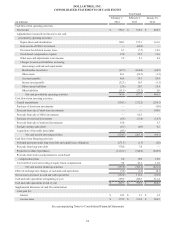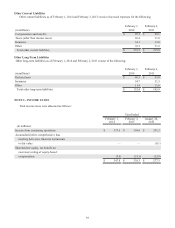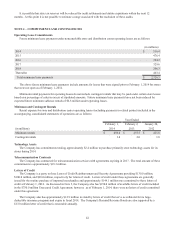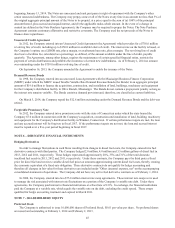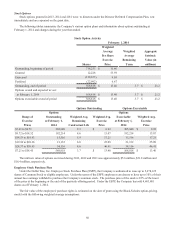Dollar Tree 2013 Annual Report Download - page 59
Download and view the complete annual report
Please find page 59 of the 2013 Dollar Tree annual report below. You can navigate through the pages in the report by either clicking on the pages listed below, or by using the keyword search tool below to find specific information within the annual report.
43
Surety Bonds
The Company has issued various surety bonds that primarily serve as collateral for utility payments at the Company’s
stores. These bonds total approximately $3.8 million and are committed through various dates through fiscal 2015.
Contingencies
A collective action was filed against the Company in federal court in Alabama claiming that store managers should have
been classified as non-exempt employees under the federal Fair Labor Standards Act (FLSA). The Court granted the
Company's motion to decertify in 2012. The individual claims of the four named plaintiffs proceeded to trial and on March 1,
2013, the jury returned verdicts in all four cases in favor of the Company. Other plaintiffs filed individual suits in various
federal courts throughout the country. All of these cases have been resolved for immaterial amounts.
A putative class action was filed in federal court in California alleging, among other things, a failure by the Company to
provide uninterrupted meal periods, to compensate for all hours worked, and to pay overtime compensation for assistant store
managers. This case has been resolved for an immaterial amount.
Winn-Dixie Stores instituted suit in federal court in Florida alleging that the Company sold products in 48 stores in
violation of a lease exclusive. In August 2012, the Court denied Winn-Dixie's claim for damages and granted Winn-Dixie’s
request for injunctive relief with respect to just one store. Winn-Dixie appealed to the U.S. Court of Appeals for the 11th
Circuit, which recently affirmed that Winn-Dixie is not entitled to damages. However, it also held that Winn-Dixie's restriction
for the Company's 21 Florida stores required the Company to restrict its sales of food and "many household supplies" such as
"soap, matches and paper napkins" to 500 square feet of floor space plus a portion of the surrounding aisle. The 11th circuit
remanded the case to the lower court for a new trial to determine the definition of "many household supplies" and how much
aisle space should be included. As many as eleven to seventeen additional Florida leases could be impacted. The Company has
previously restricted its sale of food only to 500 square feet not including the aisle.
A supermarket filed a lease exclusive case and a companion unfair competition case against the Company in a
Pennsylvania state court. Discovery has closed in the first of these actions, and trial will occur in 2014. The related unfair
competition case is in its early stages and no discovery has commenced.
A supermarket filed a lease exclusive case against the Company in Pennsylvania state court. After a trial on liability issues
only, a jury determined that the Company violated the supermarket's lease exclusive. The Company plans to appeal and
strongly disagrees with this verdict. A trial on damages will be held in 2014. Plaintiff's experts assert that plaintiff's damages
are approximately $6.2 million. Defendant's experts contend there were no damages suffered as a result of the Company’s
alleged conduct and that any damages sought cannot be reasonably proved.
In 2011, a collective action was filed against the Company by an assistant store manager and an hourly associate, alleging
they were forced to work off the clock in violation of the FLSA and state law. A federal judge in Virginia ruled that all claims
made on behalf of assistant store managers under both the FLSA and state law should be dismissed. The court, however,
conditionally certified an opt-in collective action under the FLSA on behalf of all hourly sales associates who worked for the
Company from October 2, 2009 to the present. Less than 4,300 plaintiffs remain in the case. In March 2014, the court denied
the Company's motion to decertify the collective action and the case is now continuing.
Four other FLSA putative collective action lawsuits were filed against the Company in federal courts in Georgia, Colorado,
Florida and Michigan alleging essentially the same claims on behalf of assistant store managers. A collective action was
conditionally certified in one case in federal court in Colorado, and about 2,000 plaintiffs opted in, but the Court decertified the
case in August 2013. These cases have been resolved, pending final court approval, for immaterial amounts.
A former non-exempt hourly associate who alleged his primary duty was to work a cash register, on behalf of himself and
those similarly situated, filed a Complaint under California's Labor Code and Private Attorney General Act (PAGA) in a
California state court alleging the Company failed to provide suitable seating at its cash registers as allegedly required by state
law. The Company settled the matter in 2013 for an immaterial amount.
In 2012, a former assistant store manager, on behalf of himself and those alleged to be similarly situated, filed a putative
class action in a California state court, alleging the Company failed to provide rest breaks to assistant store managers. The
alleged time period is July 13, 2008 to the present. Discovery is ongoing. A hearing on class certification will be held in 2014.
In 2012, two former store managers, under California's Labor Code and Private Attorney General Act (PAGA), instituted
suit now pending in the federal court in California on behalf of themselves and others alleged to be similarly aggrieved in the
state of California, alleging they were misclassified by the Company as exempt employees. The Company settled with one



